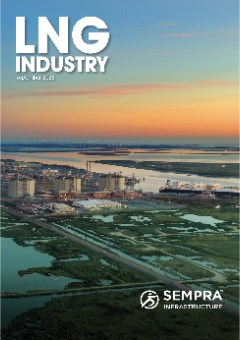Editorial comment
We’ve reached September, which may mark the beginning of a new school year for some, studies at university, or the start of work after the summer break. Other’s might have a chance to go on holiday, taking advantage of cheaper prices once kids return to school, while some (like us at LNG Industry), might be dusting off their passports to travel to Milan.
Register for free »
Get started now for absolutely FREE, no credit card required.
Of course, I’m talking about Gastech. It’s that time in the oil and gas calendar again where experts gather in one place to discuss current trends, recent developments, and plans for the future. As mentioned, Gastech is returning to Milan for 2025. As the finance and fashion capital of Italy, it acts as a great backdrop to unlock business growth opportunities and explore the latest solutions, technologies, and services to drive the energy transition.
A new specialised industry area at Gastech 2025, AI::Energy offers a chance for attendees to discover how the sector is responding to the twin challenges of artificial intelligence (AI) revolutionising energy systems while simultaneously increasing global power demand, for example through the rapid rise of data centres. The industry area will provide insight into how digital innovation across the energy chain – from automation and predictive analysis to grid optimisation and emissions tracking – is driving the next energy era.
The articles in the September issue of LNG Industry also offer various examples of how digital developments can help LNG companies and operations meet the requirements of customers, and the world at large.
GHGSat’s article considers the link between methane reduction and the ability to meet LNG demand, and how the use of technologies such as drones and satellites can help detect and quantify methane at a previously unavailable and unimaginable scale and accuracy. ASaP look at fully automated LNG custody transfer measurement systems, which are crucial for ensuring accuracy, transparency, and efficiency in the transfer of LNG and meeting the evolving needs of the industry, ultimately contributing to the growth and sustainability of the LNG market. Meanwhile, CTCI considers the importance of operator training simulations for the LNG industry, making the case for these high-fidelity platforms that combine process control logic, safety systems, and human performance into one seamless example (including digital twin integration and AI for adaptive learning paths) as a way to allow operators to practice hands-on skills without risk to personnel or assets.
The LNG Industry team will be exhibiting at Gastech in Milan from 9 – 12 September. Feel free to pick up a copy of the September issue or have a chat with us at Booth M112.
While we wait to see how AI will help and transform the LNG industry, here’s an ode to LNG, written by AI:
In steel-bound tanks so cold and tight,
A gas becomes a liquid light.
They cool it down to minus cries,
So vapour bends and liquefies.
In ships it sails the open blue,
A quiet force, both old and new.
To warm our homes, to light the night –
LNG, the silent might.
References
- ‘Optimising energy transformation through innovation’, Gastech, (2025), www.gastechevent.com/visit-aienergy


